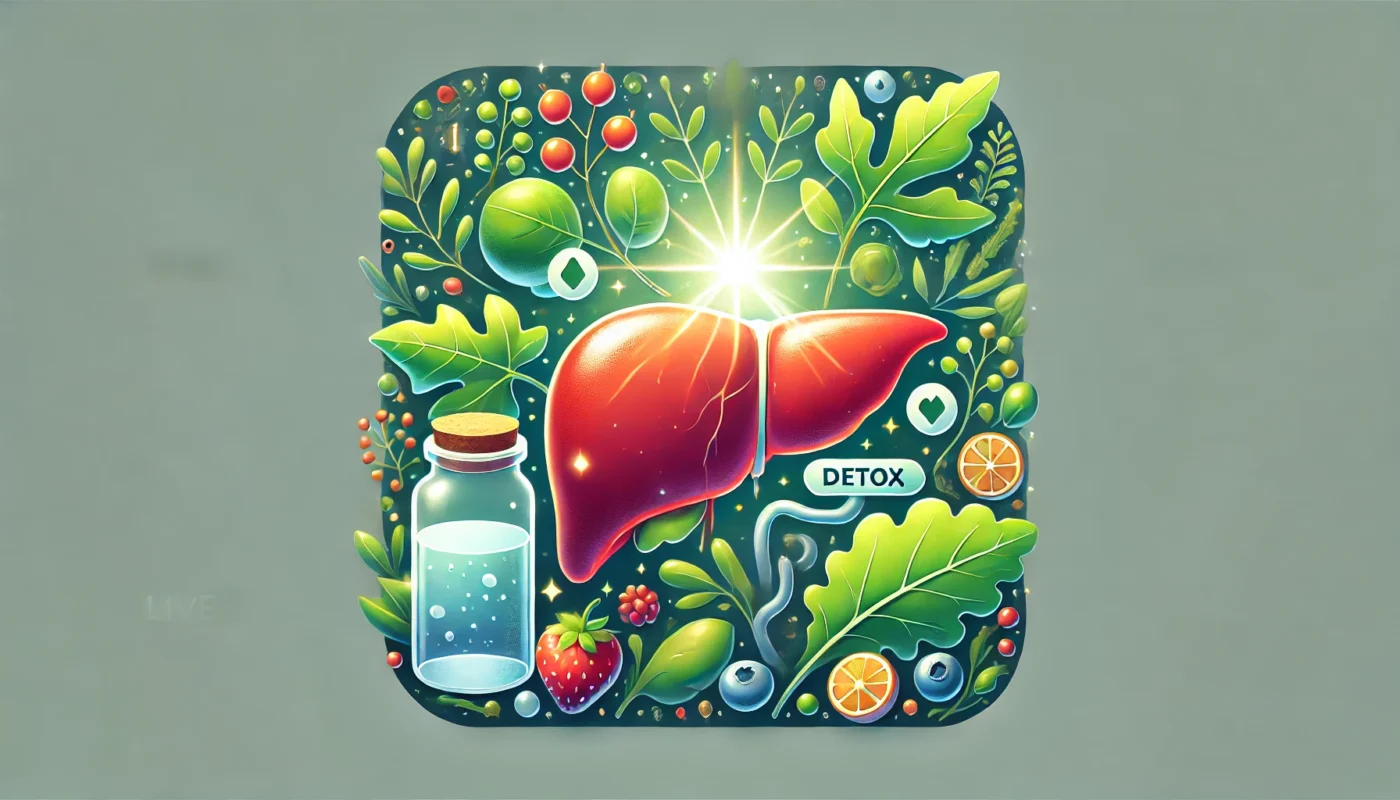Hormones play a vital role in our bodies. They act as messengers, coordinating various bodily functions.
However, maintaining hormonal balance is a complex task. It’s influenced by numerous factors, including diet, lifestyle, and environmental toxins.
When this balance is disrupted, it can lead to a range of health issues. This is where the concept of hormone detoxification comes into play.
Hormone detoxification is a process aimed at restoring hormonal balance. It involves eliminating excess hormones and supporting the body’s natural detoxification pathways.
This guide will delve into the science behind hormone detoxification. It will explain its importance, how it works, and how you can implement it in your life.
Whether you’re a fitness enthusiast, a health enthusiast, or a medical patient, this guide is designed to help you understand and apply the principles of hormone detoxification.
By the end of this comprehensive guide, you’ll have a clear understanding of how to optimize your hormonal health. You’ll also learn practical strategies to support your body’s natural detoxification processes.
Let’s embark on this journey towards improved hormonal health and overall wellbeing.
You may also like: Effective Strategies for Balancing Postpartum Hormones
What is Hormone Detoxification?
Hormone detoxification is a vital process. It helps your body maintain optimal hormonal balance by removing excess hormones and metabolic waste. This natural cleanse supports the efficient function of your organs, especially the liver, which is crucial for processing and eliminating hormones.
Hormones are chemicals that transmit signals throughout your body. They regulate various functions, from metabolism to mood. When hormonal balance is disturbed, it can lead to numerous health issues, such as weight gain, fatigue, and mood swings.
The goal of hormone detoxification is to restore this delicate balance. This involves aiding your body’s natural detoxification systems, ensuring they efficiently eliminate any surplus hormones.
Factors like diet, exercise, and lifestyle choices can significantly impact hormone detox. By making informed changes, you can enhance your body’s ability to detoxify hormones effectively.
Key elements of hormone detoxification include:
- Supporting liver function through diet and lifestyle.
- Reducing exposure to environmental toxins.
- Encouraging healthy gut function.
- Managing stress to prevent hormonal disruption.
- Ensuring adequate sleep and hydration.
Implementing a hormone detoxification plan can seem daunting, but it doesn’t need to be complicated. Understanding the fundamentals can empower you to make changes that support your body’s ability to maintain hormonal harmony.
The Role of Hormones in Your Body
Hormones are integral to your body’s internal communication. They are produced by glands and act on various organs and tissues. These chemical messengers influence numerous processes, such as growth, metabolism, and mood.
Their effects are profound, impacting how we think, feel, and act. For example, insulin regulates blood sugar, while cortisol helps control stress response.
Maintaining hormonal balance is crucial for overall health. When hormones are out of balance, it can lead to conditions like fatigue, weight gain, and anxiety. Understanding their role is the first step to fostering better health.

The Endocrine System and Hormone Regulation
The endocrine system is a network of glands. It produces and releases hormones, which are crucial for various bodily functions. These glands include the thyroid, adrenal, and pituitary glands, among others.
Each gland has a specific role and works together with others to maintain balance. For example, the pituitary gland coordinates hormone production, acting as a control center.
Hormone levels are meticulously regulated to prevent imbalances. The endocrine system uses feedback loops to monitor and adjust hormone levels. When this regulation is disrupted, it can lead to health issues and necessitate a detoxification process.
Why Hormone Detoxification is Crucial
Hormone detoxification is crucial for maintaining health and preventing disease. An imbalance can impact every aspect of health, from physical to emotional wellbeing.
The detoxification process removes excess hormones and toxins, reducing their negative impact. This process supports the liver, gut, and kidneys, the body’s primary detox systems.
Environmental factors like exposure to toxins can disrupt hormonal balance. These toxins are found in everyday items such as plastics and personal care products. Reducing exposure is a key strategy in hormone detoxification.
Incorporating hormone detoxification practices can lead to improved energy and vitality. It helps enhance mental clarity and emotional stability by supporting natural bodily functions. By prioritizing detox, you pave the way for long-term health and wellbeing.
Recognizing Hormonal Imbalances
Hormonal imbalances can quietly disrupt your health, going unnoticed until symptoms become pronounced. Being able to recognize these imbalances is crucial. They manifest in various ways, affecting physical, emotional, and mental health aspects.
Awareness of your body’s signals can help catch these imbalances early. Early detection allows for prompt intervention, preventing complications. It is important to stay attuned to unusual changes in your body.
Here are some ways to recognize hormonal imbalances:
- Unexpected weight gain or loss
- Changes in energy levels and fatigue
- Mood swings, anxiety, or depression
- Changes in skin health, such as acne
- Irregular menstrual cycles or PMS
- Altered appetite or digestion
By observing these signs, you can take proactive steps towards addressing the root causes. Learning to recognize these symptoms empowers you to seek solutions that restore balance. It’s vital to act swiftly when hormonal imbalances are suspected.
Common Symptoms and Signs
Hormonal imbalances often announce their presence through various symptoms. These symptoms affect different aspects of health, making it essential to understand them. Awareness can facilitate timely interventions.
One of the most frequent signs is fatigue, which can be overpowering. Energy dips are common, even after adequate rest. Persistent tiredness warrants further examination.
Mood changes are another significant indicator. Hormones have a profound effect on your emotional health. Anxiety, irritability, or depression can suggest hormonal shifts. Attuning yourself to emotional patterns can provide clues to underlying imbalances.
Factors Contributing to Imbalances
Several factors contribute to hormonal imbalances. Identifying these factors is the first step in restoring harmony. Many are related to lifestyle and environmental influences.
First, diet plays a pivotal role. Highly processed foods and sugars can lead to imbalances. Consuming a nutritious diet supports stable hormone levels.
Environmental toxins are another concern. Substances like plastics can act as endocrine disruptors. Reducing exposure is crucial for hormonal health.
Here are factors influencing hormonal imbalances:
- Poor nutrition choices
- Lack of physical activity
- Exposure to environmental pollutants
- High stress levels
- Inadequate sleep
- Certain medications
Lastly, stress management is essential. Chronic stress can significantly alter hormone production. Learning stress-reducing techniques offers potential for restoring balance.
Taking charge of these aspects fosters better hormonal health. With an informed approach, you can mitigate factors that contribute to imbalances. Understanding and addressing these elements leads to improved wellbeing.

The Science of Estrogen Detoxification
Estrogen detoxification is crucial, especially for maintaining balance in the body. Estrogen, a primary female sex hormone, requires proper regulation and elimination. This process is not only vital for women but also significant for men’s health.
Imbalances in estrogen can lead to a range of health issues. Symptoms like mood swings, weight gain, and menstrual irregularities often point to excessive estrogen. Therefore, managing estrogen levels is critical for overall well-being.
Detoxifying estrogen involves metabolic processes. The body naturally breaks down and eliminates excess hormones. These processes primarily occur in the liver, aided by enzymes that modulate estrogen metabolites.
The gut also plays a pivotal role in estrogen detox. Healthy gut flora is essential for the reabsorption and excretion of hormones. This interconnected system underscores the importance of comprehensive health strategies.
Optimizing estrogen detox can lead to numerous benefits. Improved energy, better mood, and hormonal harmony are some potential outcomes. By focusing on detoxification, one can proactively address hormone-related concerns.
The Liver’s Role in Hormone Metabolism
The liver is a key player in hormone metabolism. It processes and eliminates excess hormones from the body. This organ converts hormones into water-soluble forms for excretion.
Liver detoxification consists of two primary phases. In the first phase, enzymes break down hormone molecules. The second phase further alters these molecules for excretion through bile or urine.
A well-functioning liver is crucial for effective hormone detox. Supporting liver health ensures efficient hormone metabolism. This includes maintaining a balanced diet and minimizing toxin exposure.
Factors like poor diet and alcohol can impair liver function. Supporting liver health benefits hormonal balance and overall well-being. Simple lifestyle changes can enhance liver performance and detox efficiency.
Nutritional Strategies for Estrogen Detox
Nutrition plays a vital role in supporting estrogen detoxification. Certain foods and nutrients can enhance the body’s natural processes. Integrating these into your diet can promote hormonal balance effectively.
Cruciferous vegetables are particularly beneficial. Vegetables like broccoli, Brussels sprouts, and kale contain compounds that aid in hormone metabolism. They promote the breakdown of estrogen into less active forms.
Fiber intake is also critical. A diet rich in fiber aids in the removal of excess hormones. It supports gut health, ensuring efficient excretion.
Incorporating the following foods can boost estrogen detox:
- Cruciferous vegetables: broccoli, cauliflower, kale
- High-fiber foods: fruits, vegetables, whole grains
- Healthy fats: avocados, nuts, seeds
- Antioxidant-rich foods: berries, green tea
Finally, avoiding processed foods and sugar is key. Such foods can disrupt hormone balance. A focus on whole, nutrient-rich foods sustains detox pathways. In turn, this fosters an environment for optimal hormonal health.
Holistic Approaches to Hormone Detoxification
Holistic health practices emphasize treating the whole person, not just symptoms. This approach is very relevant for hormone detoxification. It integrates mind, body, and environmental factors to support hormone balance.
A variety of holistic strategies can help in hormone detox. These methods often complement conventional treatments and are gentle on the body. They encourage natural detox processes without harsh interventions.
Diet is a central component of holistic hormone detoxification. Whole foods, rich in antioxidants and nutrients, support overall detox pathways. A clean diet is foundational for maintaining hormonal equilibrium.
Beyond diet, lifestyle practices play a significant role. Stress management and physical activity form pillars of holistic approaches. These elements help regulate hormone levels and facilitate detoxification.
Consider these holistic practices to support hormone detox:
- Incorporate mindfulness techniques such as meditation and yoga.
- Prioritize eight hours of quality sleep each night.
- Engage in regular, moderate physical activity.
- Integrate relaxation techniques like breathing exercises.
By adopting these methods, individuals can foster a supportive environment for hormone detox. Holistic strategies provide a sustainable path to hormonal health. They enable the body to function optimally, promoting long-term wellbeing.
The Importance of Gut Health
The gut is often called the “second brain” due to its influence on health. It plays an essential role in hormone metabolism and detoxification. A healthy gut ensures effective hormone processing and elimination.
The gut microbiome impacts estrogen levels significantly. Beneficial bacteria aid in breaking down and excreting excess hormones. This process helps maintain hormonal balance and prevents imbalances.
Poor gut health can lead to reabsorption of hormones. This can exacerbate hormonal issues, leading to increased imbalances. Supporting gut health is crucial for effective hormone detoxification.
Probiotics and prebiotics are beneficial for gut health. Consuming fermented foods and fiber-rich fruits and vegetables can improve the microbiome. These dietary choices bolster the body’s natural detox processes.
Managing Stress and Sleep for Hormonal Health
Stress and sleep quality have a profound impact on hormone health. Chronic stress raises cortisol levels, interfering with hormone balance. Managing stress effectively is vital for maintaining hormonal harmony.
Relaxation techniques can be instrumental in stress reduction. Practices such as mindfulness, meditation, and deep breathing lower stress levels. They promote a sense of calm, aiding hormone regulation.
Adequate sleep is equally important. During sleep, the body restores and balances hormone levels. Prioritizing restorative sleep each night supports overall hormonal health.
To optimize stress and sleep for hormone detox, consider:
- Setting a consistent bedtime and wake-up routine.
- Reducing screen time before sleep to enhance melatonin production.
- Engaging in daily physical activity to reduce stress hormone levels.
Quality sleep and stress management are essential for hormone detoxification. They enable the body to perform at its best. Integrating these practices into daily life supports long-term hormone health.
Exercise’s Impact on Hormone Detox
Exercise is a powerful tool for hormone regulation and detoxification. Physical activity enhances circulation, promoting the elimination of toxins and excess hormones. It supports the endocrine system’s natural detox processes.
Different types of exercise offer unique benefits. Aerobic activities like running or cycling raise endorphin levels, reducing stress. This helps modulate cortisol and other stress-related hormones.
Strength training can boost metabolism and improve hormone sensitivity. It helps in optimizing the body’s use of insulin and managing estrogen levels. Regular strength exercises also support bone health, crucial for hormonal stability.
Routine physical activity encourages balanced hormone levels. It aids in better sleep, stress management, and overall vitality. Exercise truly plays a pivotal role in maintaining hormonal health.
Herbs, Supplements, and Hydration
Herbs and supplements provide additional support for hormone detoxification. They can enhance the body’s natural ability to balance and excrete hormones. Using these with a mindful approach ensures efficacy and safety.
Milk thistle and dandelion root are popular herbs for liver health. They assist in hormone metabolism and clearance. These herbs support liver function, enhancing detoxification processes.
Adaptogens like ashwagandha and Rhodiola help manage stress. They modulate cortisol levels, which is essential for overall hormonal balance. Stress reduction aids in preventing hormonal imbalances.
Proper hydration is often underestimated in its importance. Adequate water intake facilitates the elimination of toxins and metabolites. It ensures the optimal functioning of detoxification pathways.
Consider these supplements and practices for hormone detox:
- Milk thistle for liver support.
- Adaptogenic herbs like ashwagandha for stress management.
- Staying well-hydrated with at least eight glasses of water daily.
Incorporating herbs, supplements, and hydration practices can significantly aid hormone detox. They provide a gentle yet effective approach to maintaining hormone equilibrium. These elements support a holistic lifestyle focused on overall health.

Implementing a Safe and Effective Hormone Cleanse
Embarking on a hormone cleanse requires careful planning and consideration. It’s crucial to approach detoxification systematically to ensure safety and efficacy. A strategic plan helps in achieving desired hormonal balance without adverse effects.
Firstly, understand your starting point. Identify any specific hormonal imbalances and tailor your cleanse to address these issues. This individualized approach maximizes benefits and reduces potential side effects.
Incorporating a diverse array of detoxification strategies can support your cleanse. Rely on whole foods, promote hydration, and include regular physical activity. These practices enhance your body’s natural detox pathways effectively.
Here are some key steps for a successful hormone cleanse:
- Begin with a gentle diet, eliminating processed foods and sugars.
- Focus on foods that support liver health, like cruciferous vegetables and garlic.
- Introduce stress-reducing activities, like yoga or meditation, into daily routine.
- Gradually increase exercise intensity to support hormonal health.
- Monitor your progress and adjust the plan as needed for optimal results.
Throughout the cleanse, staying attuned to your body’s responses is essential. This awareness allows for necessary adaptations to ensure continued improvement. It’s about fostering a sustainable lifestyle change, not a quick fix.
Finally, remember patience is paramount. Hormonal health improves over time, with consistent effort and dedication. A well-implemented cleanse can set the foundation for enduring balance and wellness.
Personalized Medicine and Hormone Detox
Personalized medicine has gained prominence for its tailored approach to health. It involves crafting detox plans based on individual genetic, biological, and lifestyle factors. This methodology ensures more effective and safer hormone detoxification.
Understanding your unique hormone profile is the first step. Tests can identify specific imbalances, guiding the detoxification strategy. This allows for precise interventions rather than a one-size-fits-all approach.
Personalized plans might include bespoke dietary recommendations and tailored exercise regimens. They consider specific hormone-related needs and the most effective methods to address them. This individualized focus enhances the likelihood of successful outcomes.
As a result, personalized medicine empowers individuals. It helps them make informed decisions about their hormone health journey. This approach fosters a deeper understanding and connection to one’s wellbeing.
Consulting Healthcare Professionals
Consulting healthcare professionals is vital before starting any hormone cleanse. They provide essential insights into your hormonal needs and potential risks. Professional guidance ensures your cleanse is both safe and effective.
Healthcare providers can conduct diagnostic tests to evaluate hormone levels. These assessments form the basis of a targeted detox plan. Identifying underlying conditions that may affect hormone balance is crucial for success.
Professionals also offer support in choosing appropriate supplements or medications. They can recommend specific herbs or treatments tailored to your unique needs. This guidance enhances the safety of incorporating alternative therapies.
Engaging with healthcare experts provides reassurance. It ensures you’re on the right track towards achieving hormonal balance. Remember, professional advice is an invaluable part of any health journey.
Measuring and Tracking Hormonal Health
Tracking progress is key to understanding the effectiveness of your hormone detox efforts. Regular assessments enable you to see changes and adjust strategies as necessary. It is part of a comprehensive approach to hormone health.
Hormone tests and assessments help monitor progress. Whether through blood tests, saliva, or urine analysis, these metrics provide insights into hormonal shifts. Tracking enables timely interventions and tweaks to your detox plan.
Journaling symptoms and changes is another effective tracking method. Note physical, mental, and emotional shifts throughout the cleanse. This documentation provides a clear picture of how lifestyle changes are impacting hormone levels.
Combining scientific data with personal observations leads to a holistic view of hormonal health. It empowers individuals to make informed, proactive adjustments. This approach ensures continued improvement and balance over time.
By measuring and tracking, you gain invaluable feedback. It guides your actions, ensuring sustained health and vitality. This proactive method is crucial for lasting hormone health success.
Risks and Considerations in Hormone Detoxification
Embarking on a hormone detoxification journey necessitates caution. Although it offers numerous benefits, it’s not without potential risks. Understanding these dangers helps in taking preventive measures.
One common risk is disrupting your endocrine balance further. When not executed correctly, detox regimens can lead to deficiencies or hormonal imbalances. This underscores the importance of informed planning and execution.
Additionally, some detoxification practices may cause short-term adverse effects. Symptoms like fatigue, headaches, or digestive issues can arise. These responses are often your body’s way of adjusting, but they should be closely monitored.
There is also the risk of interacting with existing health conditions. Those with underlying health issues should be especially cautious. Consulting with healthcare professionals before starting any cleanse is critical to minimize negative impacts.
Potential Risks and How to Mitigate Them
Understanding potential risks aids in mitigating them effectively. Hormone detoxification is not a universal solution, and recognizing this is crucial. Personal health, lifestyle, and goals should guide detox decisions.
First, avoid extreme diets or abrupt lifestyle changes. These can overwhelm your body and create unwanted stress. Instead, adopt gradual, sustainable changes that your body can adjust to comfortably.
Second, watch for signs of nutrient deficiency. Hormone detoxes can sometimes strip essential nutrients if not managed carefully. Maintain a balanced diet rich in whole foods and diverse nutrients.
Lastly, listen to your body’s signals. Fatigue or irritability can indicate an imbalance. It’s important to adjust your detox plan or seek professional advice if such symptoms persist.
The Importance of Evidence-Based Practices
Relying on evidence-based practices fortifies your hormone detoxification journey. Scientific support adds credibility and safety to the methods you choose. This approach diminishes reliance on trends lacking solid proof.
Start by consulting relevant research on hormone detoxification. Stay informed about what has been proven effective. This ensures your decisions are grounded in facts, not fads.
Incorporate interventions with verified benefits. Herbs, supplements, and dietary changes should have empirical support. This reduces the risk of ineffective or harmful interventions.
Emphasizing evidence enhances your detoxification efforts’ integrity. It fosters better outcomes through informed choices. Aligning practice with research ensures a trustworthy path to hormonal balance.
Conclusion and Next Steps
Hormone detoxification is a powerful tool for achieving optimal health. It’s a process that requires understanding, planning, and commitment. With the right approach, the benefits are immense.
The journey to hormonal balance is highly personal. It involves evaluating your lifestyle, habits, and overall health. Adopting best practices and making incremental changes are crucial steps.
Moving forward, the focus should be on sustainability. Gradual adaptation is often more successful than radical transformations. Consistency and patience are key to realizing lasting improvements in hormonal health.
Embracing a Holistic and Balanced Lifestyle
Holistic living promotes harmony across body, mind, and spirit. It goes beyond detoxifying hormones. It’s about integrating practices that support all aspects of your well-being.
Balance is central to this approach. Consider nutrition, exercise, sleep, and stress management. Together, these elements foster an environment conducive to hormonal health.
Adopting this lifestyle involves a proactive stance. Make choices that align with long-term wellness goals. Over time, these collective efforts can lead to profound changes in health and vitality.
Seeking Professional Guidance for Personalized Plans
Navigating hormone detoxification benefits from expert input. Personalized plans tailored to individual needs ensure safety and effectiveness. Health professionals play an essential role in crafting these.
Professional guidance can adapt recommendations to unique health backgrounds. This personalization enhances the likelihood of positive outcomes and minimizes risks.
Moreover, expert advice can provide clarity and direction. It empowers individuals to make informed decisions. Such collaboration paves the way for a more effective and confident approach to hormonal balance.
Staying Informed and Educated
Continuous learning is vital in hormone health. The field is dynamic, with research consistently offering new insights. Staying informed elevates understanding and effectiveness of detox strategies.
Reliable, evidence-based sources are essential for ongoing education. They dispel myths and reinforce credible practices. Exploring reputable content helps in discerning fact from fiction.
Moreover, education fosters empowerment. It encourages individuals to take charge of their health. With accurate knowledge, navigating the complexities of hormone detoxification becomes more straightforward and rewarding.
Further Reading:
Dr. Jolene Brighten: How to Balance Hormones with a Holistic Detox
Beautiful One: 4 Daily Rhythms to Holistically Detox from Estrogen Dominance
Rupa Health: How to Support Optimal Liver Estrogen Detoxification
hormone detox, hormone cleanse, personalized medicine, detoxification strategies, hormonal balance, health and wellness, nutrition, holistic health, evidence-based practices, healthcare professionals, lifestyle changes, tracking hormonal health, risks of detoxification, sustainable health, wellness journey
Important Note: The information contained in this article is for general informational purposes only, and should not be construed as health or medical advice, nor is it intended to diagnose, prevent, treat, or cure any disease or health condition. Before embarking on any diet, fitness regimen, or program of nutritional supplementation, it is advisable to consult your healthcare professional in order to determine its safety and probable efficacy in terms of your individual state of health.
Regarding Nutritional Supplements Or Other Non-Prescription Health Products: If any nutritional supplements or other non-prescription health products are mentioned in the foregoing article, any claims or statements made about them have not been evaluated by the U.S. Food and Drug Administration, and such nutritional supplements or other health products are not intended to diagnose, treat, cure, or prevent any disease.

